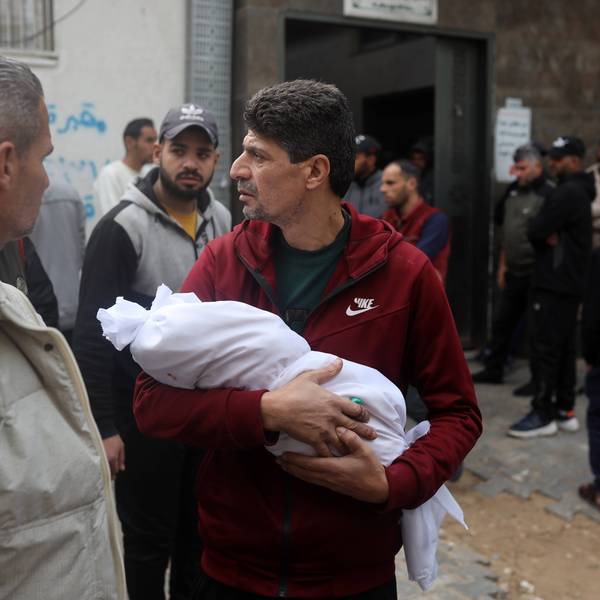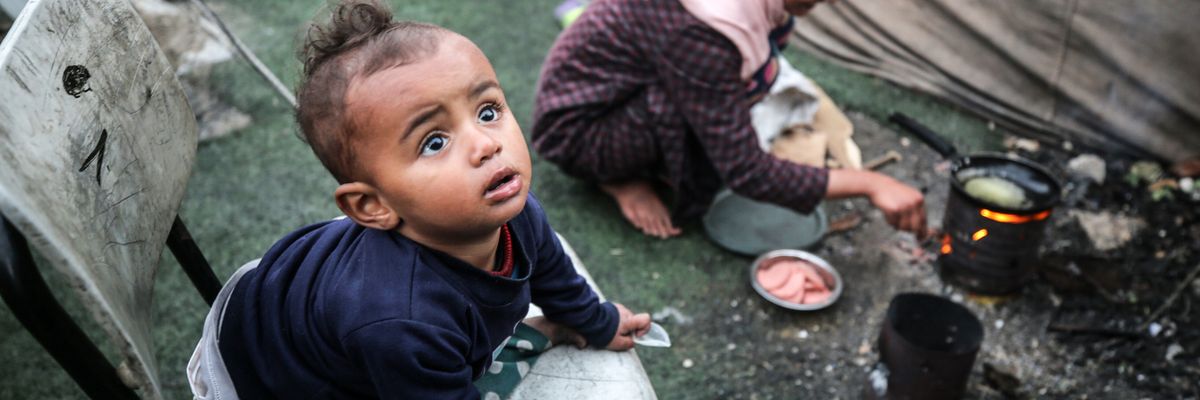With malnutrition and infectious diseases spreading rapidly, United Nations officials warned Monday that child deaths in the Gaza Strip are set to surge if Israel's war and blockade are allowed to continue.
In a joint statement, the United Nations Children's Fund (UNICEF), the World Food Program (WFP), and the World Health Organization (WHO) said that "food and safe water have become incredibly scarce" in Gaza, imperiling the health of children as well as pregnant and breastfeeding women.
The U.N. organizations cited a recent analysis by the Global Nutrition Cluster, which found that children in northern Gaza and Rafah—a severely overcrowded city that Israel is preparing to invade—are facing particularly severe malnutrition. But "while there are differences in the data from different governates," the analysis stressed, all the available evidence "indicates a dire nutrition situation for the entire population of Gaza."
The Global Nutrition Cluster found that more than 90% of Gaza children between the ages of 6 and 23 months are facing "severe food poverty," eating "two or fewer food groups each day." At least 90% of children under 5 years old have been impacted by one or more infectious diseases, the analysis estimated.
Infectious diseases are spreading among children in part due to the lack of clean water, a scarcity fueled by Israel's siege and attacks on the enclave's water infrastructure. "An increased number of infants now rely on formula milk for survival—which requires safe and clean water," the analysis notes.
Mike Ryan, executive director of the WHO's emergencies program, said Monday that "hunger and disease are a deadly combination."
"Hungry, weakened, and deeply traumatized children are more likely to get sick, and children who are sick, especially with diarrhea, cannot absorb nutrients well," said Ryan. "It's dangerous, and tragic, and happening before our eyes."
"The Gaza Strip is poised to witness an explosion in preventable child deaths which would compound the already unbearable level of child deaths in Gaza."
Despite an order from the International Court of Justice to ensure the delivery of humanitarian aid to Gaza, Israel has continued impeding critical assistance in recent weeks. Le Monde reported last week that Israel "has blocked a shipment of United Nations food aid, intended to feed over a million Gazans for a month."
"Finance Minister Bezalel Smotrich said Tuesday, February 13, he had issued a directive blocking the 1,049 containers, which mainly contain flour, but also cooking oil, chickpeas, sugar, and rice," noted the French newspaper. "The U.N. was set to distribute these supplies in and around the city of Rafah, where more than half of Gaza's inhabitants are caught between the Egyptian border and Israeli infantry."
Access to humanitarian assistance has been further hampered by Israeli forces firing on Gazans as they wait for aid convoys to arrive. In desperation, some Gazans have resorted to eating grass and bread made from animal feed.
Ted Chaiban, UNICEF's deputy executive director for humanitarian action and supply operations, said Monday that "if the conflict doesn't end now, children's nutrition will continue to plummet, leading to preventable deaths or health issues which will affect the children of Gaza for the rest of their lives and have potential intergenerational consequences."
"The Gaza Strip is poised to witness an explosion in preventable child deaths which would compound the already unbearable level of child deaths in Gaza," said Chaiban.
Israel's assault on Gaza has killed more than 29,000 people in less than five months; women and children account for two-thirds of the death toll.
The U.N. organizations said Monday that "an immediate humanitarian cease-fire continues to provide the best chance to save lives and end suffering."
After opposing and obstructing the global push for a cease-fire, the administration of U.S. President Joe Biden is reportedly circulating a U.N. Security Council resolution that calls for a "temporary cease-fire in Gaza as soon as practicable, based on the formula of all hostages being released."
"The good news: Biden is finally willing to endorse a U.N. Security Council resolution on a Gaza cease-fire," Kenneth Roth, the former executive director of Human Rights Watch, wrote early Tuesday in response to the draft text. "The bad news: He wants it to be 'as soon as practicable,' which for [Israeli Prime Minister Benjamin] Netanyahu probably means never. That wiggle room must be closed."




